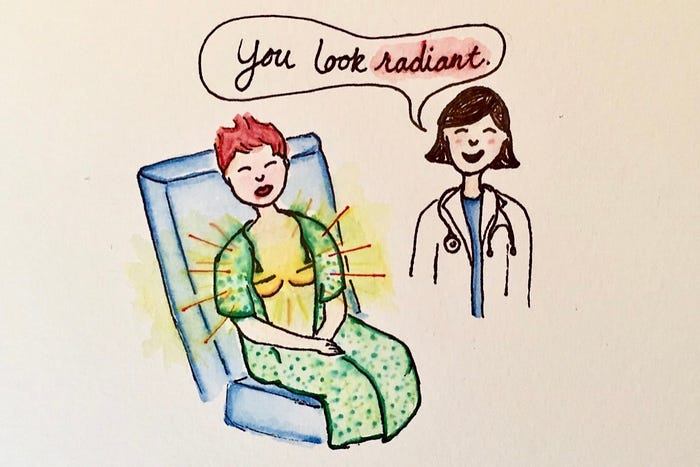Embracing the complexity of cancer

A few weeks ago I was diagnosed with early stage breast cancer. I spent the last 18 months worrying about my health and the well-being of my loved ones in the face of a global pandemic, completely forgetting about the fact that my life can be threatened by diseases other than a coronavirus. Now I’m here, navigating the logistical and emotional challenges of being a cancer patient and hey, it’s difficult.
Here is what I’ve learned about the experience so far.
Cancer is usually not black or white. As soon as they hear the word, most people associate it with death — but the two are not always, not necessarily, not automatically connected. Thanks to advanced medical treatments, better screening options and increased awareness amongst the general population, cancer is often caught early and proves treatable. (As an example, 99% of early stage breast cancer patients are cured from the disease.)
That said, just because it is so often treatable, cancer is still a life-altering experience that involves a significant amount of stress, loss and grief. It turns your entire world upside down, shifts your priorities, and reminds you of your mortality in nerve-wrecking, heartbreaking and unpredictable ways. Dealing with cancer means you might lose parts of your body, have to undergo invasive treatments with challenging side effects, or that you have to give up on some of your life goals and dreams — for instance, becoming a parent. Research shows that being diagnosed with breast (and other types of) cancer often leads to depression and anxiety, even in cases where the long-term prognosis is otherwise excellent.
And yet, our current narrative about cancer is marked by false binaries. We talk about “easy” or “difficult” treatments, “good” and “bad” types of cancer, et cetera. In reality, most cancer experiences fall somewhere in between. Embracing this ambiguity might help those actively fighting the disease to express their feelings, anxieties and needs in accurate ways.
When the body is hurting, the self is hurting too. People can easily forget about the inextricable link between the body and the ego, and consequently, the emotional toll that it takes to lose control over our bodies in any way. When I learned that I have a tumor in my breast, the most anxiety-inducing emotion that I had — besides worrying over my life and hating my body for betraying me — was the fear that I might lose some of my body parts. How will my 4-year old react to seeing me without those breasts that nursed her for so long and provided comfort when she was upset? How will my loved ones, including my partner, react to my bald head and thinned eyebrows?
Thinking about losing body parts has been a deeply unsettling experience, but what I also realized was this: I wasn’t so concerned about my body image as I was about my bodily integrity — my right to self-determination over my physical boundaries. Can I reject mastectomy (aka the full removal of my breasts) if the advantages are not convincing? Will I be able to say no to chemo if it’s not improving my longer-term prognosis? Will I be told that my boobs are “dispensable”, that I have a misguided attachment to an overly sexualized part of my body, or that my fear of losing my hair is only a sign of vanity? Luckily, I didn’t even have to face those tensions as I’ve had the privilege to work with doctors who fully respect the bodily autonomy of their patients. That, however, is not an option for many.
We should normalize (and even encourage!) mourning. For patients and those who support them, the ‘cancer journey’ is full of losses — both bigger and smaller ones. At some point during their treatment, people will be mourning the time they could have spent with their families, work or hobbies, instead of going to excessive exams and exhausting therapies. They will mourn their lost body parts and organs, the money they spent on treatment, or their sanity and happiness in general. Experiencing such loss is similar to grief, to the extent that it has distinct stages and often happens in non-linear ways. Because of that, cancer patients appreciate being able to explicitly acknowledge their losses and to be allowed to mourn, even when their life isn’t over.
And yet, in modern-day societies, grief is usually a private matter — for obvious and valid reasons. That need for privacy sits in contrast with the fact that dealing with cancer requires a village, and that cancer patients are much better off when they are surrounded by strong support networks. Finding a balance will be key for those fighting the disease.
…
Hey y’all, it’s breast cancer awareness month! Did you know that if caught early, 99% of breast cancer is treatable? Go get that mammogram in the diary, please!
